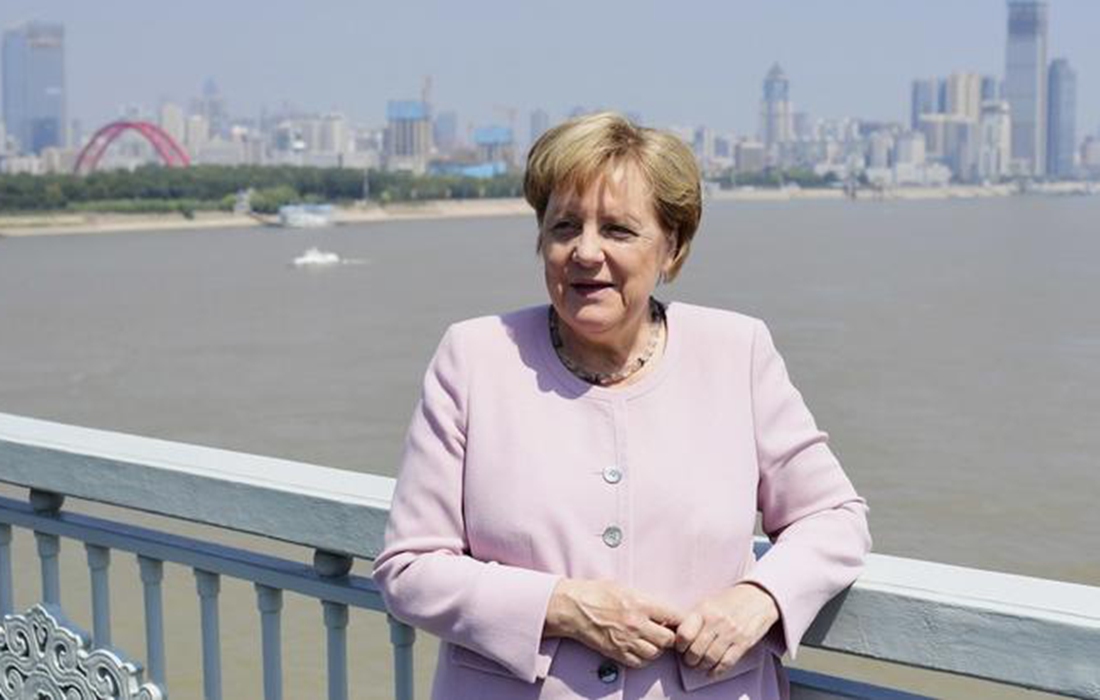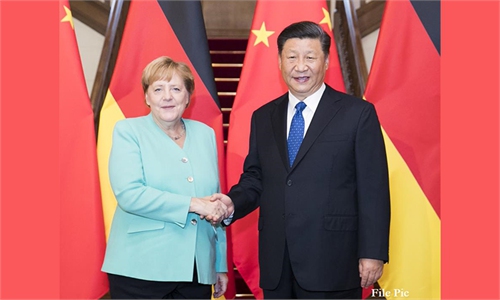
German Chancellor Angela Merkel poses for a photo on Wuhan Yangtze River Bridge during her visit to Wuhan, Central China's Hubei Province on September 7, 2019. Photo: IC
Chinese Premier Li Keqiang held a video conference with German Chancellor Angela Merkel on Monday, and said China hopes the upcoming new administration of Germany would maintain a positive and pragmatic policy toward China to reinforce the mainstream of cooperation of China-Germany ties.
This is the latest interaction between Chinese leaders with Merkel after Chinese President Xi Jinping met with Merkel by video link on October 13 and praised Merkel's contributions to China-Germany relations and China-EU ties.
Li told Merkel that the two sides should keep using the inter-governmental consultation mechanism to expand and strengthen cooperation, and China is willing to work with Germany and other countries to jointly deal with climate change and strengthen international cooperation to fight the COVID-19 pandemic.
China will be more open, and hopefully the two sides can remain open to each other, to safeguard the rules-based multilateral trade system together and the stability of the global industry and supply chains, Li said.
Analysts noted that with increasing uncertainties awaiting China-Germany relations since Merkel is about to step down, and coalition negotiations to establish a new German administration are ongoing, Chinese leaders and Merkel are working to cement the political legacy on pragmatic strategy and promote China-EU relations.
Chinese leaders have close interactions with Merkel because she has played an important role in pushing China-Germany relations, which has also set a good example for China-EU ties. Both Merkel and Chinese leaders hope the political legacy on adhering to pragmatic cooperation could be carried on by the new German administration since it fits the interests of both sides, Cui Hongjian, director of the Department of European Studies at the China Institute of International Studies, told the Global Times.
The Social Democratic Party of Germany (SPD), The Greens and the Free Democratic Party (FDP) have agreed to proceed from exploratory talks to coalition negotiations over establishing a new German administration, but experts pointed to the possible risk and influence of an unclear China policy.
There will be voices to maintain cooperation with China in the future new government of Germany. But some people may interpret the close interactions in a negative way and set hurdles. If the new leaders of Germany are not able to learn how to take China's development in an objective and inclusive way, they may make narrow-minded political policies or blindly follow a certain country in stressing the divergence with China, Cui noted.
Cui noted that judging from the recent political situation in Germany, the new government may focus on internal affairs, on how to cooperate with each party and deal with economic problems. This may lead to the decline of Germany's leading role in China-EU relations, and future China-EU relations may rely more on the cooperative mechanism between China and the EU.
On Friday, President Xi also held a phone conversation with European Council President Charles Michel, during which the two leaders stressed strategic independence and agreed on promoting communications.
At the crossroads of improving China-EU relations, the high-level talks are significant for both sides since there simultaneously exist different voices toward China-related policies within the EU and NATO, including those insisting on standing with the US to implement strategic competition with China, and those preferring to build a stronger connection with China, said Li Haidong, a professor at the Institute of International Relations of the China Foreign Affairs University.
The recent close interaction between the two sides sends a message that China holds a sincere desire to communicate with the EU, particularly with those who take a strong stand to expand consensus between China and the EU, Li Haidong said.
It's not difficult for friends of China to clarify through direct dialogue that China still advocates external communication and strengthening all-round exchanges with the EU, which will definitely help enhance the China-EU engagement and the EU's confidence in China, Li Haidong told the Global Times.

